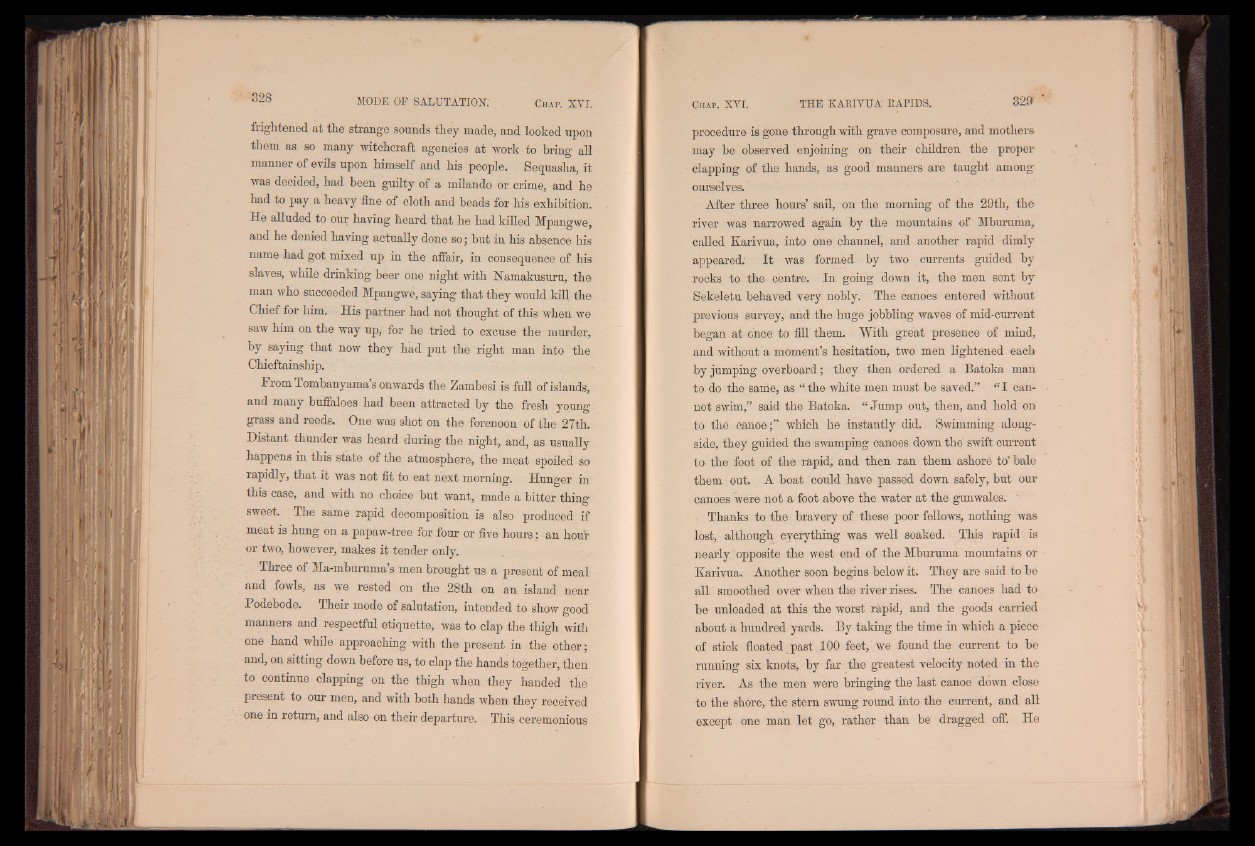
frightened at the strange sounds they made, and looked upon
them as so many witchcraft agencies at work to bring all
manner of evils upon himself and his people. Sequasha, it
was decided, had been guilty of a milando or crime, and he
had to pay a heavy fine of cloth and beads for his exhibition.
He alluded to our having heard that he had killed Mpangwe,
and he denied having actually done so; but in his absence his
name had got mixed up in the affair, in consequence of his
slaves, while drinking beer one night with Namakusuru, the
man who succeeded Mpangwe, saying that they would kill the
Chief for him. His partner had not thought of this when we
saw him on the way up, for he tried to excuse the murder,
by saying that now they had put the right man into the
Chieftainship.
From Tombanyama’s onwards the Zambesi is full of islands,
and many buffaloes had been attracted by the fresh young
grass and reeds. One was shot on the forenoon of the 27th.
Distant thunder was heard during the night, and, as usually
happens in this state of the atmosphere, the meat spoiled so
rapidly, that it was not fit to eat next morning. Hunger in
this case, and with no choice but want, made a bitter thing
sweet. The same rapid decomposition is also produced if
meat is hung on a papaw-tree for four or five hours; an hour
or two, however, makes it tender only.
Three of Ma-mburuma’s men brought us a present of meal
and fowls, as we rested on the 28th on an island near
Podebode. Their mode of salutation, intended to show good
manners and respectful etiquette, was to clap the thigh with
one hand while approaching with the present in the other;
and, on sitting down before us, to clap the hands together, then
to continue clapping on the thigh when they handed the
present to our men, and with both hands when they received
one in return, and also on their departure. This ceremonious
procedure is gone through with grave composure, and mothers
may be observed enjoining on their children the proper
clapping of the hands, as good manners are taught among
ourselves.
After three hours’ sail, on the morning of the 29th, the
river was narrowed again by the mountains of Mburuma,
called Karivua, into one channel, and another rapid dimly
appeared: I t was formed by two currents guided by
rocks to the centre. In going down it, the men sent by
Sekeletu behaved very nobly. The canoes entered without
previous survey, and the huge jobbling waves of mid-current
began at once to fill them. With great presence of mind,
and without a moment’s hesitation, two men lightened each
by jumping overboard; they then ordered a Batoka man
to do the same, as “ the white men must be saved.” “ I cannot
swim,” said the Batoka. “ Jump out, then, and hold on
to the canoe;” which he instantly did. Swimming alongside,
they guided the swamping canoes down the swift current
to the foot of the rapid, and then ran them ashore to'bale
them out. A boat could have passed down safely, but our
canoes were not a foot above the water at the gunwales. '
Thanks to the bravery of these poor fellows, nothing was
lost, although everything was well soaked. This rapid is
nearly opposite the west end of the Mburuma mountains or
Karivua. Another soon begins below it. They are said to be
all smoothed over when the river rises. The canoes had to
be unloaded at this the worst rapid, and the goods carried
about a hundred yards. By taking the time in which a piece
of stick floated past 100 feet, we found the current to be
running six knots, by far the greatest velocity noted in the
river. As the men were bringing the last canoe down close
to the shore, the stern swung round into the current, and all
except one man let go, rather than be dragged off. He